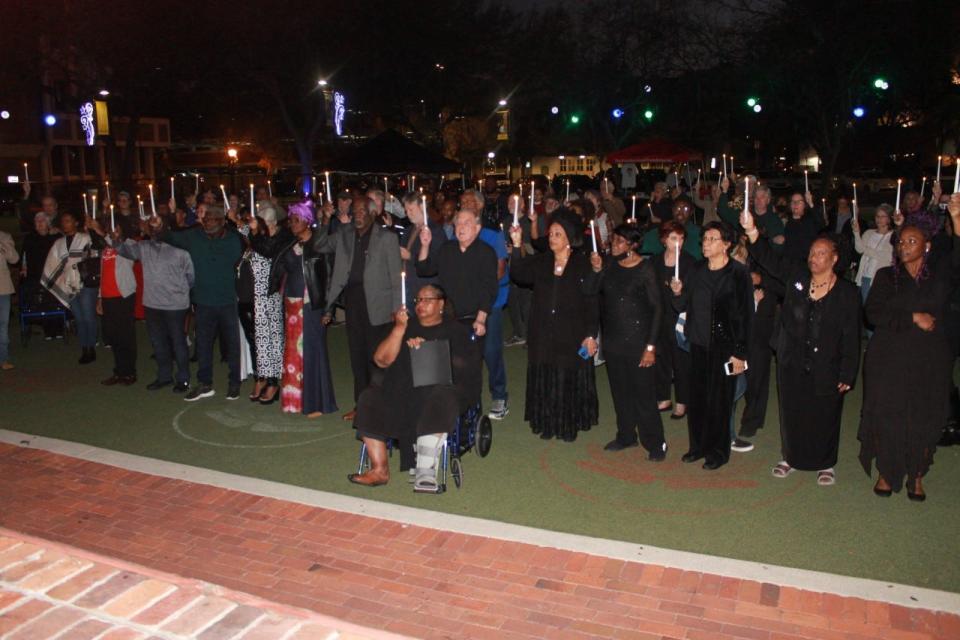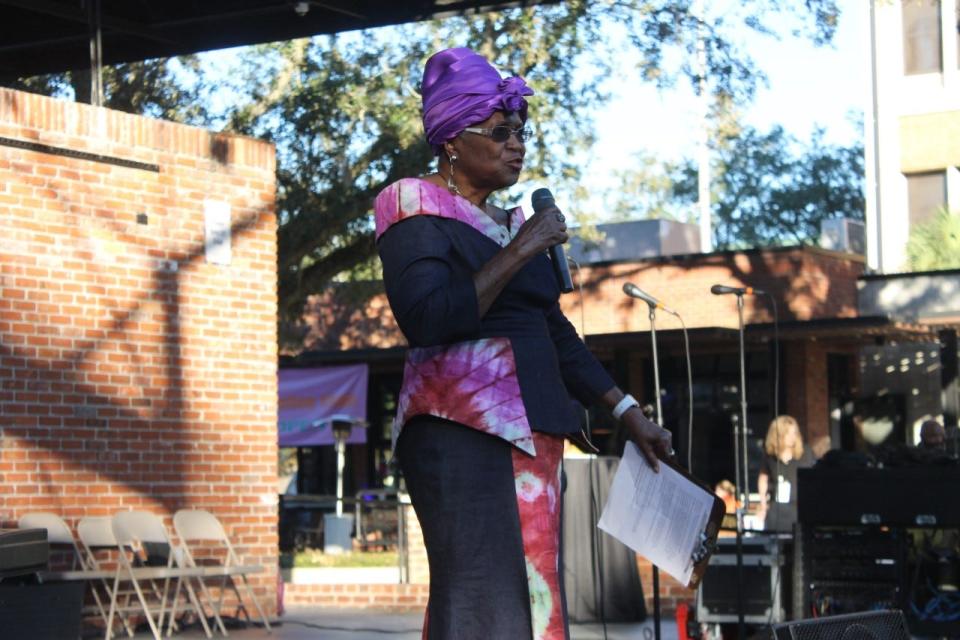Crowd gathers in Gainesville to remember Rosewood Massacre and to celebrate the future
Descendants of the Rosewood Massacre gathered with friends and family to recognize their history and discuss ways to create a better future during an event held to remember the centennial anniversary of one of the most horrific incidences of racial brutality in Florida and the nation.
The Real Rosewood Foundation Inc. sponsored the event attended by about 100 people held Saturday at the Bo Diddley Downtown Community Plaza in downtown Gainesville. It featured speakers, stories of hope and reconciliation, and live performances by local musicians.
Remembering Rosewood:Remembering Rosewood
Rosewood Massacre:Yoho files bill to name Rosewood a national landmark
King Holiday:Gainesville events to celebrate life of MLK, commemorate Rosewood Massacre centennial
The theme for the event was "Rosewood Forever: Remember, Learn, Celebrate."
“Rosewood is not about me. It’s about teaching the history of Rosewood,” said Lizzie Robinson-Jenkins, co-founder of The Real Rosewood Foundation. “I’m glad to be here to tell the details. If it wasn’t for everyone’s support, I would not be here.”
Robinson-Jenkins is the niece of Mahulda Gussie Brown Carrier, a school teacher (from 1915 to 1923) in Rosewood at the time of the massacre. Carrier survived the horrific events and lived in fear until her death in Tampa in 1948, Robinson-Jenkins said, adding that her aunt moved 10 times and changed her name five times because of the fear.
Robinson-Jenkins co-founded the foundation 20 years ago with her husband, John M. Jenkins Sr., after accepting the request to do so by her mother, the late Theresa Brown Robinson, in 1993. The foundation was founded to research, document and preserve the history the massacre.

Robinson-Jenkins said the massacre's centennial anniversary is an opportunity for the public to share in furthering the vision of empowering humanity by exploring the Rosewood journey and legacy to develop a better future for all.
“My goal is to close the racial divide,” Robinson-Jenkins said. “There is too much hatred and I’m sick of it.”
Robinson-Jenkins said she remembers her mother telling her the story of Rosewood when she was 5 years old in 1943.
“That story attached to me ever since,” Robinson-Jenkins said. “Everybody is born for a reason. The story was left in my hands.”
Rosewood is along State Road 24, a few miles northeast of Cedar Key in Levy County.

History of Rosewood
On the morning of Jan. 1, 1923, Fannie Coleman Taylor, a married white woman in nearby Sumner, claimed a Black man assaulted her, though some believe her lover was the real suspect, according to RosewoodFlorida.com.
A mob that included Ku Klux Klan members who were in Gainesville for a rally assembled and in the following days, the mob beat Black residents and burned the town down, according to the foundation’s website.
Jordan Marlowe, the mayor of Newberry and chair of The Real Rosewood Foundation, was also in attendance and claimed some members of the white mob formed in Gainesville.
“She (Robinson-Jenkins) has kept history alive and has been committed to this work,” Marlowe said. “If you stand for truth and reconciliation, you must honor Mrs. Lizzie Jenkins.”
Marlowe and Paris Doctor, co-founder of The Descendants of Rosewood Foundation, were the hosts during the ceremony.
Bishop Leo Robinson of the New PowerHouse Family Worship Center welcomed the audience and began the ceremony with prayer.
His prayer was followed by singing from the Rosewood Quartet, which is comprised of members of Phi Beta Sigma Inc.
Jon Rehm, Ph.D., a social studies curriculum specialist with Alachua County Public Schools, shared his thoughts on the importance of children learning about history to rectify injustices that are going on currently.
There were music performances by the 1000 Voices, Josh Taylor, who sang “God Bless America,” and Jane Fallon, who sang “Before the Fire: Rosewood.”
Fallon is an award-winning songwriter from New Hampshire who recently relocated to Dunedin.
Friends Valara Petteway and Iana Patterson traveled from Starke to attend the event.
Patterson recalled watching the Rosewood movie depicted in the 1997 film by director John Singleton, which she said she still have on an original VHS tape.
Petteway said after hearing about the history of town, she felt compelled to be present at the event.
“I felt it was my duty to come and be here,” Petteway said. “People need to learn and understand the history.”
The speakers during the event were Yolanda Means, a Meldon Law attorney and a descendant of Rosewood; attorney Jeffrey Meldon of Meldon Law; Jerry Urso of the Rosewood Magnolia Masonic Lodge No. 148; painter and The Real Rosewood Foundation board member Pedro Jermaine; Patricia and Phillip Frost Art Museum curator Yady Rivero and poet Rob Murphy.
“(Robinson-Jenkins') willingness to educate has touched me,” Rivero said. “She is a product of her mother’s zeal. I feel blessed to be in a position to help share her story.”
There were performances by the Mu Epsilon chapter of Zeta Phi Beta Sorority, of which Robinson Jenkins is a member.
The night ended with two performances from 1000 Voices, who sang “Rosewood to Redemption,” which Jenkins said was penned by Bob McPeek. The following performance was from Robinson-Jenkins herself, who sang a Rosewood song that her mother wrote.
Afterwards, the audience held candles to pay their respects to Rosewood descendants.
“This is an awesome representation of Rosewood and what we stand for and the hate we stand against,” Robinson Jenkins said. “We got to work together to keep hate away from our children and our homes.”
Robinson-Jenkins said she will be the host of an upcoming podcast called Queen Lizzie’s Podcast that will air on Jan. 17 on Facebook, YouTube and Spotify.
On Jan. 25 through April 16, the Patricia and Phillip Frost Art Museum, at the Florida International University in Miami, will host a Rosewood Exhibition titled, “An Elegy to Rosewood” that will be comprised of historic photographs and heirlooms from Robinson Jenkins.
This exhibition will be part of the Martin Luther King Jr. Exhibition Series.
The Real Rosewood Foundation is seeking donations for their next project to create the Rosewood History Museum.
Robinson-Jenkins said her plan is to use the John and Mary Wright House of Rosewood as the museum to showcase Rosewood memorabilia and artifacts. Her goal is to have the home, which was purchased by Ian Stone in 2020 and was donated to the foundation in 2021, placed on her family’s property in Archer.
“Our children need to know this information. We can’t let this die,” she said her mother used to tell her.
For more information about the foundation, visit RosewoodFlorida.com.
This article originally appeared on The Gainesville Sun: Rosewood Massacre event in Gainesville draws approximately 100 people
